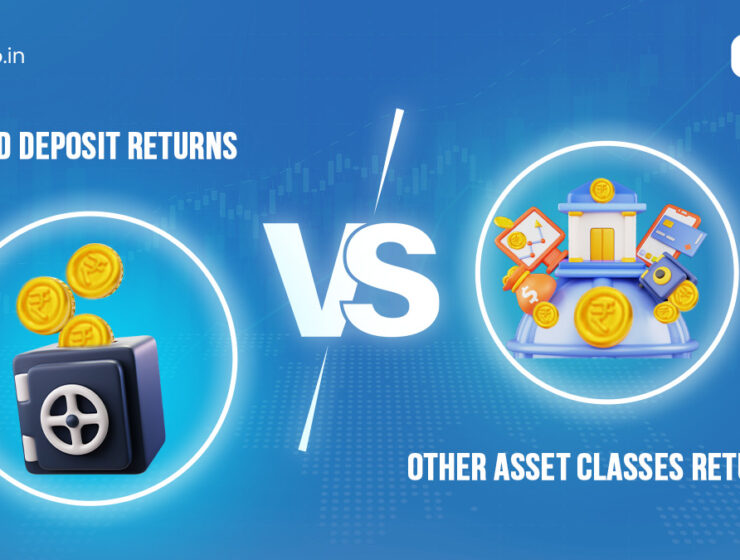

According to the provisions of the latest Union Budget, 2018, a long term capital gains tax would be imposed on long term capital gains incurred from selling equity shares or equity-related investments. This provision has got investors worried about their equity investments. They are in doubt whether to hold onto their investments or to sell them off before 31st March 2018 and book their tax-free profits. This dilemma has created a furore in the equity market which has been in a tizzy ever since the budget was presented on 1st February 2018. Are you too wondering about the correct course of action to take?
You must be. After all, it is your hard-earned income on which you would have to pay tax. But, before you take any action, you should know the actual implications of the new rule. So, here’s what’s changed –
- Capital gains made from selling equity shares and equity-oriented investments after holding them for 12 months would be taxed.
- The tax rate would be 10%
- Taxation would be applicable only if the gains are more than Rs.1 lakh
- A tax would become effective from 1st April 2018.
- The price of the instrument as on 31st January 2018 would be considered as the cost price of the instrument. Any increase thereafter would be attributed to tax. For instance, if equity shares bought in 2004 @ Rs.100 would have a market value of Rs.500/share on 31st January 2018; Rs.500 would be considered to be the cost of acquisition. The increase in the value from Rs.100 to Rs.500, i.e. Rs.400 would be grandfathered. It would not be used to compute the capital gains. Sale price exceeding Rs.500 would account for a gain and attract a capital gains tax.
Now that you are familiar with the new provisions, the decision to hold or sell your investments depends on the value of your investments before 31st March 2018. The following examples show whether you should sell or hold your investments depending on different values –
Example 1
| Cost of the equity share | Rs.200 |
| Market Value of the share on 31st January 2018 | Rs.400 |
| Market value of the share on the selling date (which is before 31st March 2018) | Rs.375 |
| Capital gains incurred | Nil – cost of acquisition (Rs.400) is more than the selling price (Rs.375) |
| What should you do? | Hold your investments |
Explanation:- Even though you are making a profit of Rs.175/share (as the original cost price is higher than the selling price), for tax computation purposes, the price effective on 31st January 2018 would be considered. Since the market value on 31st January 2018 is higher than the actual selling price, there is no long term capital gain incurred from the viewpoint of tax. Thus, you would not incur any tax when you sell your investments. Since no tax is incurred, you can hold on to your investments till after 31st March 2018.
Example 2
| Cost of the equity share | Rs.200 |
| Market Value of the share on 31st January 2018 | Rs.400 |
| Market value of the share on the selling date (which is before 31st March 2018) | Rs.500 |
| Capital gains incurred | Rs.100– cost of acquisition (Rs.400) is less than the selling price (Rs.500) |
| Tax payable | 10% of Rs.100 = Rs.10/share |
| What should you do? | Sell your investments by 31st March 2018 and then buy again |
Explanation:- As you are incurring a gain of Rs.100 based on the market value of the share on 31st January 2018, LTCG tax would be applicable. However, this tax would become effective from 1st April 2018. So, if the price remains more than Rs.400 till 31st March 2018, you should sell your investments. Any capital gains made before 31st March 2018 would be exempted from tax. Thus, you would escape tax on your gains. Later on, you can buy back the instrument for getting future returns.
Example 3
| Cost of the equity share | Rs.200 |
| Market Value of the share on 31st January 2018 | Rs.400 |
| Market value of the share on the selling date (which is before 31st March 2018) | Rs.180 |
| Capital gains incurred | Nil – cost of acquisition (Rs.400) is more than the selling price (Rs.180) |
| What should you do? | Hold your investments |
Explanation:- The selling price is not only lower than the market value on 31st January 2018, it is also lower than the actual cost price of Rs.200. In this case, you would be making a loss if you sell your investments. As such, you should hold onto the stocks and wait for an increase in its price. There is no sense in selling and booking your losses.
So, the decision to sell or hold your equity investments should be considered in relation to the selling price and its price on 31st January 2018. Only if the selling price is higher than the price on 31st January 2018 and you are making a profit, should you consider selling? Otherwise, hold onto your stocks and enjoy better returns.
A financial planning platform where you can plan all your goals, cash flows, expenses management, etc., which provides you advisory on the go. Unbiased and with uttermost data security, create your Financial Planning without any cost on: http://bit.ly/Robo-Fintoo
Disclaimer: The views shared in blogs are based on personal opinion and does not endorse the company’s views. Investment is a subject matter of solicitation and one should consult a Financial Adviser before making any investment using the app. Making an investment using the app is the sole decision of the investor and the company or any of its communication cannot be held responsible for it.
Related Posts
Stay up-to-date with the latest information.


